Impact of Structure, Culture and Leadership on Healthcare
VerifiedAdded on 2020/10/23
|12
|3109
|422
Report
AI Summary
This report delves into the various influences shaping health and social care organizations. It begins by comparing and contrasting different organizational structures, such as functional, matrix, and divisional, highlighting their strengths and weaknesses. The report then explores the concept of organizational culture, examining how shared values and beliefs impact employee behavior and service delivery within the sector, with examples like power, role, person, and task cultures. Theories related to individual and group behavior, including Maslow's Hierarchy of Needs and Tuckman's stages of team development, are analyzed to understand their impact on organizational dynamics. Furthermore, the report assesses the impact of organizational structure and culture on service delivery, particularly in the context of Voluntary Services Overseas. Finally, the report discusses leadership concepts, leadership styles (democratic, autocratic, laissez-faire), and how leadership can influence the effectiveness of health and social care organizations, along with evaluating specific leadership contributions.
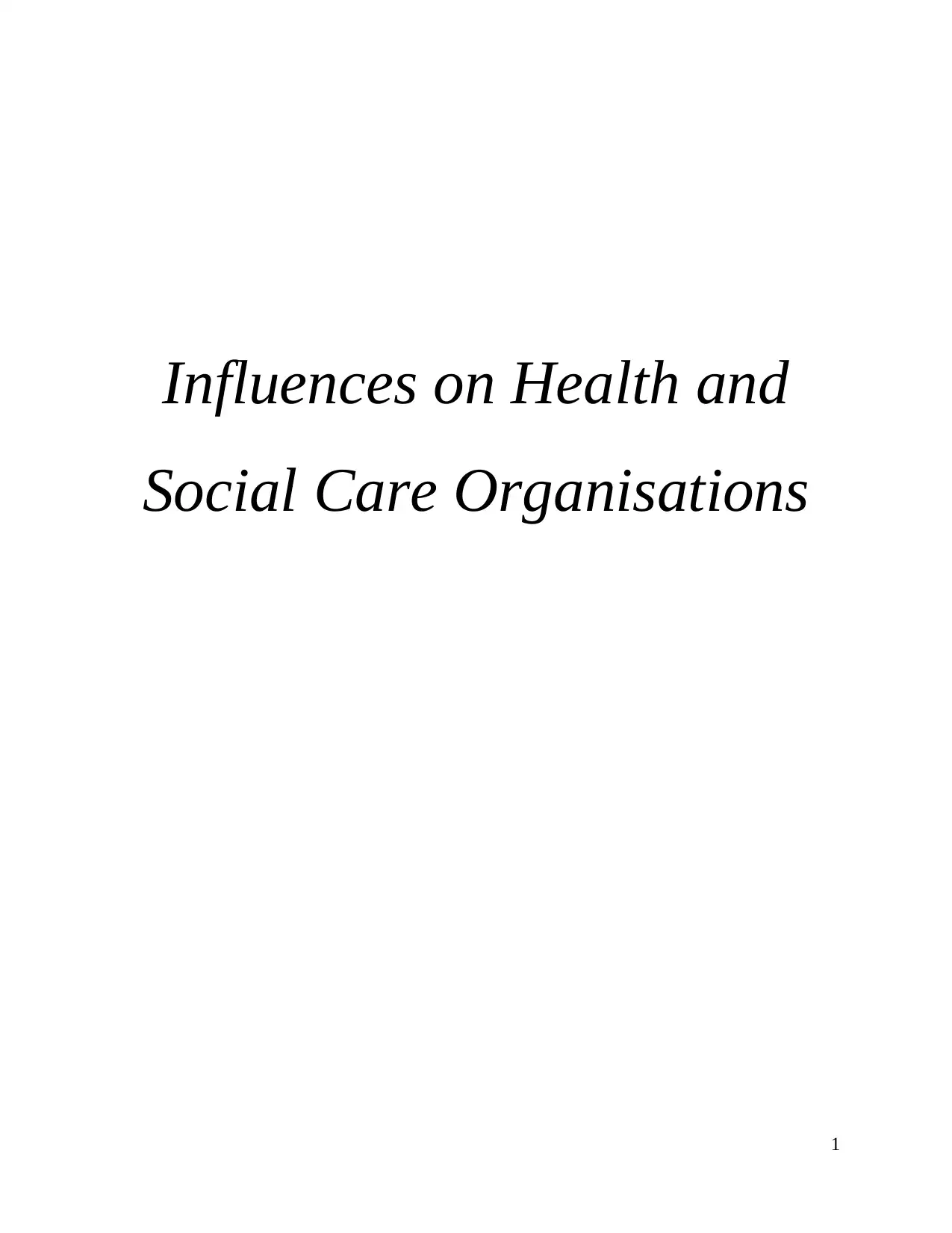
Influences on Health and
Social Care Organisations
1
Social Care Organisations
1
Paraphrase This Document
Need a fresh take? Get an instant paraphrase of this document with our AI Paraphraser
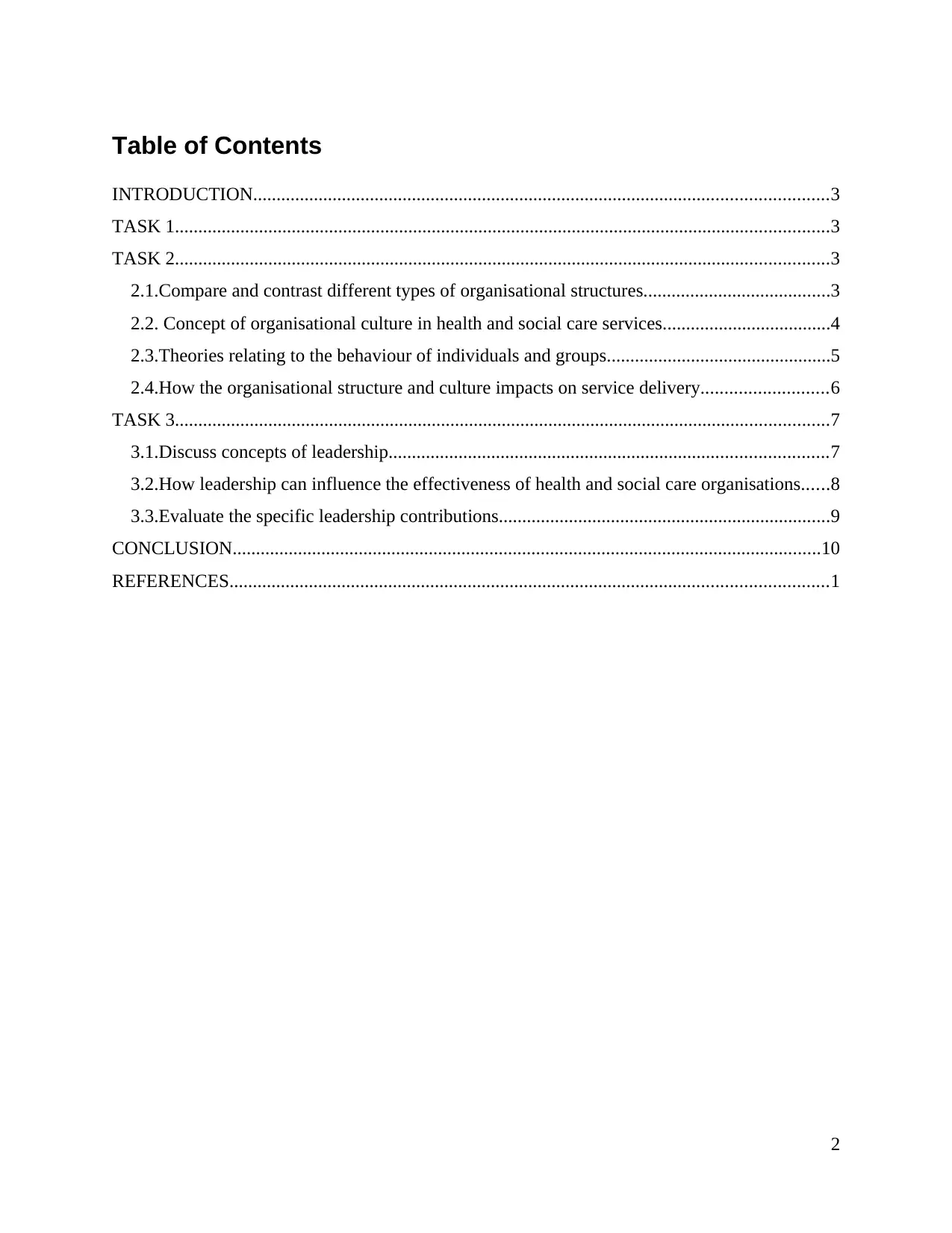
Table of Contents
INTRODUCTION...........................................................................................................................3
TASK 1............................................................................................................................................3
TASK 2............................................................................................................................................3
2.1.Compare and contrast different types of organisational structures........................................3
2.2. Concept of organisational culture in health and social care services....................................4
2.3.Theories relating to the behaviour of individuals and groups................................................5
2.4.How the organisational structure and culture impacts on service delivery...........................6
TASK 3............................................................................................................................................7
3.1.Discuss concepts of leadership..............................................................................................7
3.2.How leadership can influence the effectiveness of health and social care organisations......8
3.3.Evaluate the specific leadership contributions.......................................................................9
CONCLUSION..............................................................................................................................10
REFERENCES................................................................................................................................1
2
INTRODUCTION...........................................................................................................................3
TASK 1............................................................................................................................................3
TASK 2............................................................................................................................................3
2.1.Compare and contrast different types of organisational structures........................................3
2.2. Concept of organisational culture in health and social care services....................................4
2.3.Theories relating to the behaviour of individuals and groups................................................5
2.4.How the organisational structure and culture impacts on service delivery...........................6
TASK 3............................................................................................................................................7
3.1.Discuss concepts of leadership..............................................................................................7
3.2.How leadership can influence the effectiveness of health and social care organisations......8
3.3.Evaluate the specific leadership contributions.......................................................................9
CONCLUSION..............................................................................................................................10
REFERENCES................................................................................................................................1
2
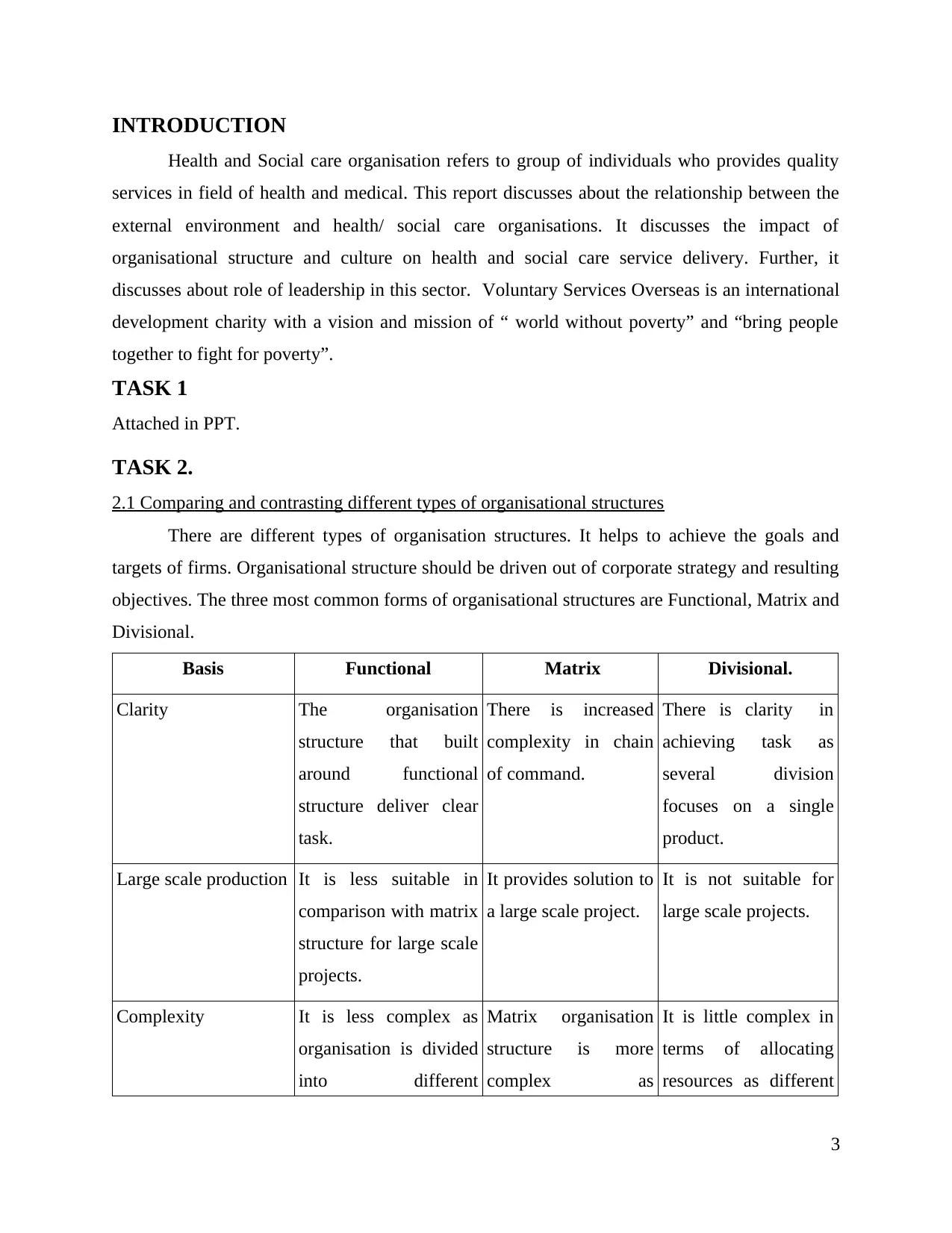
INTRODUCTION
Health and Social care organisation refers to group of individuals who provides quality
services in field of health and medical. This report discusses about the relationship between the
external environment and health/ social care organisations. It discusses the impact of
organisational structure and culture on health and social care service delivery. Further, it
discusses about role of leadership in this sector. Voluntary Services Overseas is an international
development charity with a vision and mission of “ world without poverty” and “bring people
together to fight for poverty”.
TASK 1
Attached in PPT.
TASK 2.
2.1 Comparing and contrasting different types of organisational structures
There are different types of organisation structures. It helps to achieve the goals and
targets of firms. Organisational structure should be driven out of corporate strategy and resulting
objectives. The three most common forms of organisational structures are Functional, Matrix and
Divisional.
Basis Functional Matrix Divisional.
Clarity The organisation
structure that built
around functional
structure deliver clear
task.
There is increased
complexity in chain
of command.
There is clarity in
achieving task as
several division
focuses on a single
product.
Large scale production It is less suitable in
comparison with matrix
structure for large scale
projects.
It provides solution to
a large scale project.
It is not suitable for
large scale projects.
Complexity It is less complex as
organisation is divided
into different
Matrix organisation
structure is more
complex as
It is little complex in
terms of allocating
resources as different
3
Health and Social care organisation refers to group of individuals who provides quality
services in field of health and medical. This report discusses about the relationship between the
external environment and health/ social care organisations. It discusses the impact of
organisational structure and culture on health and social care service delivery. Further, it
discusses about role of leadership in this sector. Voluntary Services Overseas is an international
development charity with a vision and mission of “ world without poverty” and “bring people
together to fight for poverty”.
TASK 1
Attached in PPT.
TASK 2.
2.1 Comparing and contrasting different types of organisational structures
There are different types of organisation structures. It helps to achieve the goals and
targets of firms. Organisational structure should be driven out of corporate strategy and resulting
objectives. The three most common forms of organisational structures are Functional, Matrix and
Divisional.
Basis Functional Matrix Divisional.
Clarity The organisation
structure that built
around functional
structure deliver clear
task.
There is increased
complexity in chain
of command.
There is clarity in
achieving task as
several division
focuses on a single
product.
Large scale production It is less suitable in
comparison with matrix
structure for large scale
projects.
It provides solution to
a large scale project.
It is not suitable for
large scale projects.
Complexity It is less complex as
organisation is divided
into different
Matrix organisation
structure is more
complex as
It is little complex in
terms of allocating
resources as different
3
⊘ This is a preview!⊘
Do you want full access?
Subscribe today to unlock all pages.

Trusted by 1+ million students worldwide
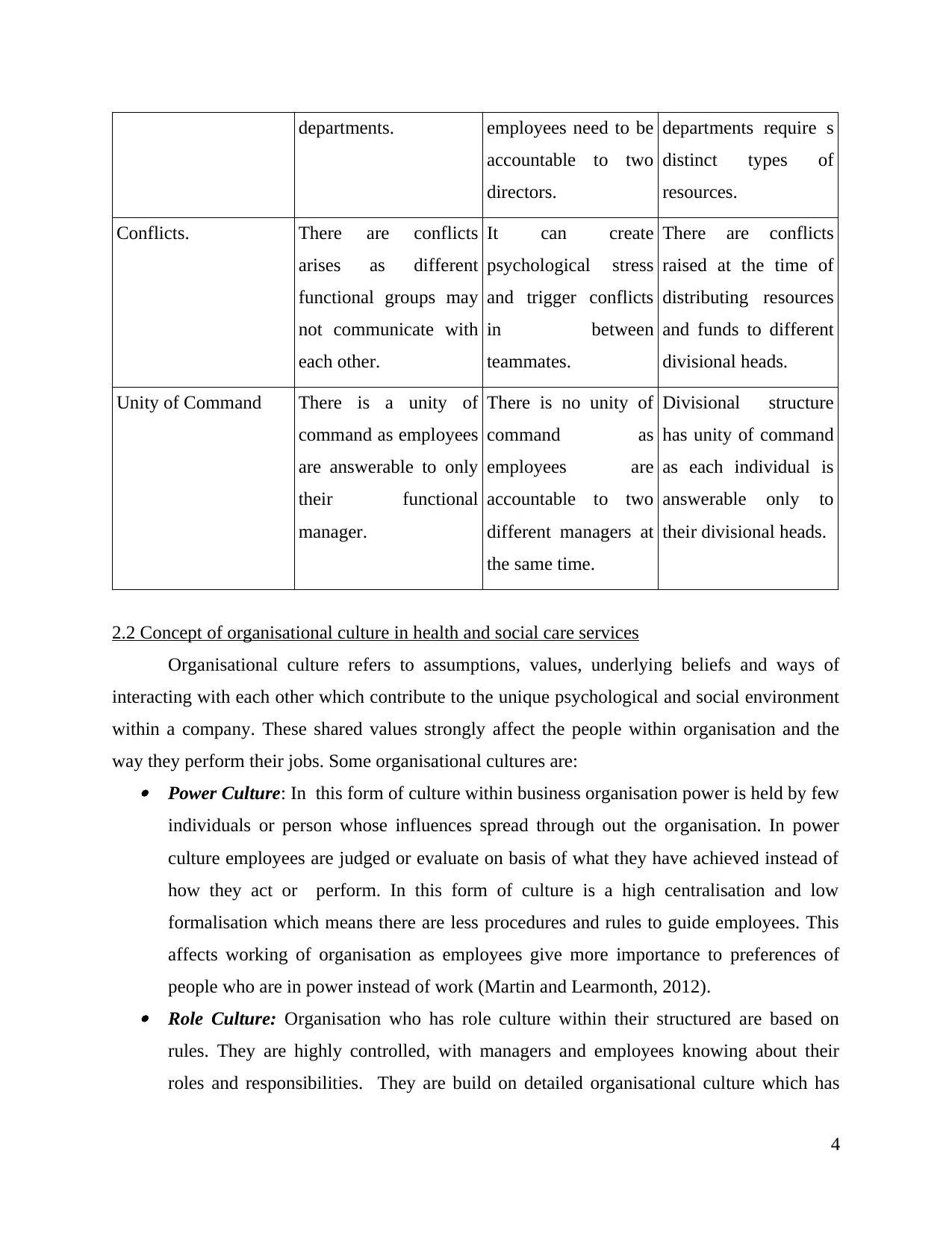
departments. employees need to be
accountable to two
directors.
departments require s
distinct types of
resources.
Conflicts. There are conflicts
arises as different
functional groups may
not communicate with
each other.
It can create
psychological stress
and trigger conflicts
in between
teammates.
There are conflicts
raised at the time of
distributing resources
and funds to different
divisional heads.
Unity of Command There is a unity of
command as employees
are answerable to only
their functional
manager.
There is no unity of
command as
employees are
accountable to two
different managers at
the same time.
Divisional structure
has unity of command
as each individual is
answerable only to
their divisional heads.
2.2 Concept of organisational culture in health and social care services
Organisational culture refers to assumptions, values, underlying beliefs and ways of
interacting with each other which contribute to the unique psychological and social environment
within a company. These shared values strongly affect the people within organisation and the
way they perform their jobs. Some organisational cultures are: Power Culture: In this form of culture within business organisation power is held by few
individuals or person whose influences spread through out the organisation. In power
culture employees are judged or evaluate on basis of what they have achieved instead of
how they act or perform. In this form of culture is a high centralisation and low
formalisation which means there are less procedures and rules to guide employees. This
affects working of organisation as employees give more importance to preferences of
people who are in power instead of work (Martin and Learmonth, 2012). Role Culture: Organisation who has role culture within their structured are based on
rules. They are highly controlled, with managers and employees knowing about their
roles and responsibilities. They are build on detailed organisational culture which has
4
accountable to two
directors.
departments require s
distinct types of
resources.
Conflicts. There are conflicts
arises as different
functional groups may
not communicate with
each other.
It can create
psychological stress
and trigger conflicts
in between
teammates.
There are conflicts
raised at the time of
distributing resources
and funds to different
divisional heads.
Unity of Command There is a unity of
command as employees
are answerable to only
their functional
manager.
There is no unity of
command as
employees are
accountable to two
different managers at
the same time.
Divisional structure
has unity of command
as each individual is
answerable only to
their divisional heads.
2.2 Concept of organisational culture in health and social care services
Organisational culture refers to assumptions, values, underlying beliefs and ways of
interacting with each other which contribute to the unique psychological and social environment
within a company. These shared values strongly affect the people within organisation and the
way they perform their jobs. Some organisational cultures are: Power Culture: In this form of culture within business organisation power is held by few
individuals or person whose influences spread through out the organisation. In power
culture employees are judged or evaluate on basis of what they have achieved instead of
how they act or perform. In this form of culture is a high centralisation and low
formalisation which means there are less procedures and rules to guide employees. This
affects working of organisation as employees give more importance to preferences of
people who are in power instead of work (Martin and Learmonth, 2012). Role Culture: Organisation who has role culture within their structured are based on
rules. They are highly controlled, with managers and employees knowing about their
roles and responsibilities. They are build on detailed organisational culture which has
4
Paraphrase This Document
Need a fresh take? Get an instant paraphrase of this document with our AI Paraphraser
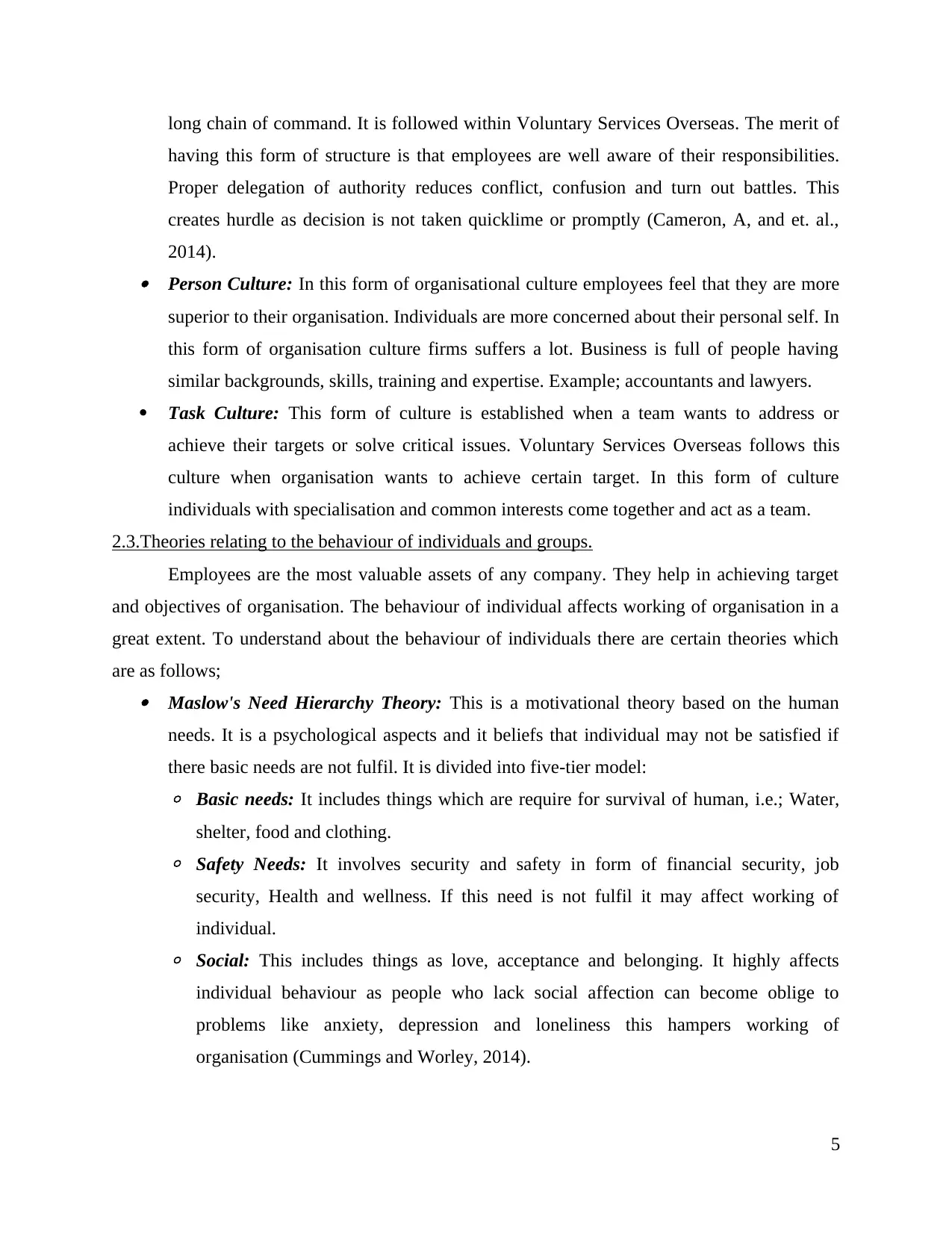
long chain of command. It is followed within Voluntary Services Overseas. The merit of
having this form of structure is that employees are well aware of their responsibilities.
Proper delegation of authority reduces conflict, confusion and turn out battles. This
creates hurdle as decision is not taken quicklime or promptly (Cameron, A, and et. al.,
2014). Person Culture: In this form of organisational culture employees feel that they are more
superior to their organisation. Individuals are more concerned about their personal self. In
this form of organisation culture firms suffers a lot. Business is full of people having
similar backgrounds, skills, training and expertise. Example; accountants and lawyers.
Task Culture: This form of culture is established when a team wants to address or
achieve their targets or solve critical issues. Voluntary Services Overseas follows this
culture when organisation wants to achieve certain target. In this form of culture
individuals with specialisation and common interests come together and act as a team.
2.3.Theories relating to the behaviour of individuals and groups.
Employees are the most valuable assets of any company. They help in achieving target
and objectives of organisation. The behaviour of individual affects working of organisation in a
great extent. To understand about the behaviour of individuals there are certain theories which
are as follows; Maslow's Need Hierarchy Theory: This is a motivational theory based on the human
needs. It is a psychological aspects and it beliefs that individual may not be satisfied if
there basic needs are not fulfil. It is divided into five-tier model:
◦ Basic needs: It includes things which are require for survival of human, i.e.; Water,
shelter, food and clothing.
◦ Safety Needs: It involves security and safety in form of financial security, job
security, Health and wellness. If this need is not fulfil it may affect working of
individual.
◦ Social: This includes things as love, acceptance and belonging. It highly affects
individual behaviour as people who lack social affection can become oblige to
problems like anxiety, depression and loneliness this hampers working of
organisation (Cummings and Worley, 2014).
5
having this form of structure is that employees are well aware of their responsibilities.
Proper delegation of authority reduces conflict, confusion and turn out battles. This
creates hurdle as decision is not taken quicklime or promptly (Cameron, A, and et. al.,
2014). Person Culture: In this form of organisational culture employees feel that they are more
superior to their organisation. Individuals are more concerned about their personal self. In
this form of organisation culture firms suffers a lot. Business is full of people having
similar backgrounds, skills, training and expertise. Example; accountants and lawyers.
Task Culture: This form of culture is established when a team wants to address or
achieve their targets or solve critical issues. Voluntary Services Overseas follows this
culture when organisation wants to achieve certain target. In this form of culture
individuals with specialisation and common interests come together and act as a team.
2.3.Theories relating to the behaviour of individuals and groups.
Employees are the most valuable assets of any company. They help in achieving target
and objectives of organisation. The behaviour of individual affects working of organisation in a
great extent. To understand about the behaviour of individuals there are certain theories which
are as follows; Maslow's Need Hierarchy Theory: This is a motivational theory based on the human
needs. It is a psychological aspects and it beliefs that individual may not be satisfied if
there basic needs are not fulfil. It is divided into five-tier model:
◦ Basic needs: It includes things which are require for survival of human, i.e.; Water,
shelter, food and clothing.
◦ Safety Needs: It involves security and safety in form of financial security, job
security, Health and wellness. If this need is not fulfil it may affect working of
individual.
◦ Social: This includes things as love, acceptance and belonging. It highly affects
individual behaviour as people who lack social affection can become oblige to
problems like anxiety, depression and loneliness this hampers working of
organisation (Cummings and Worley, 2014).
5
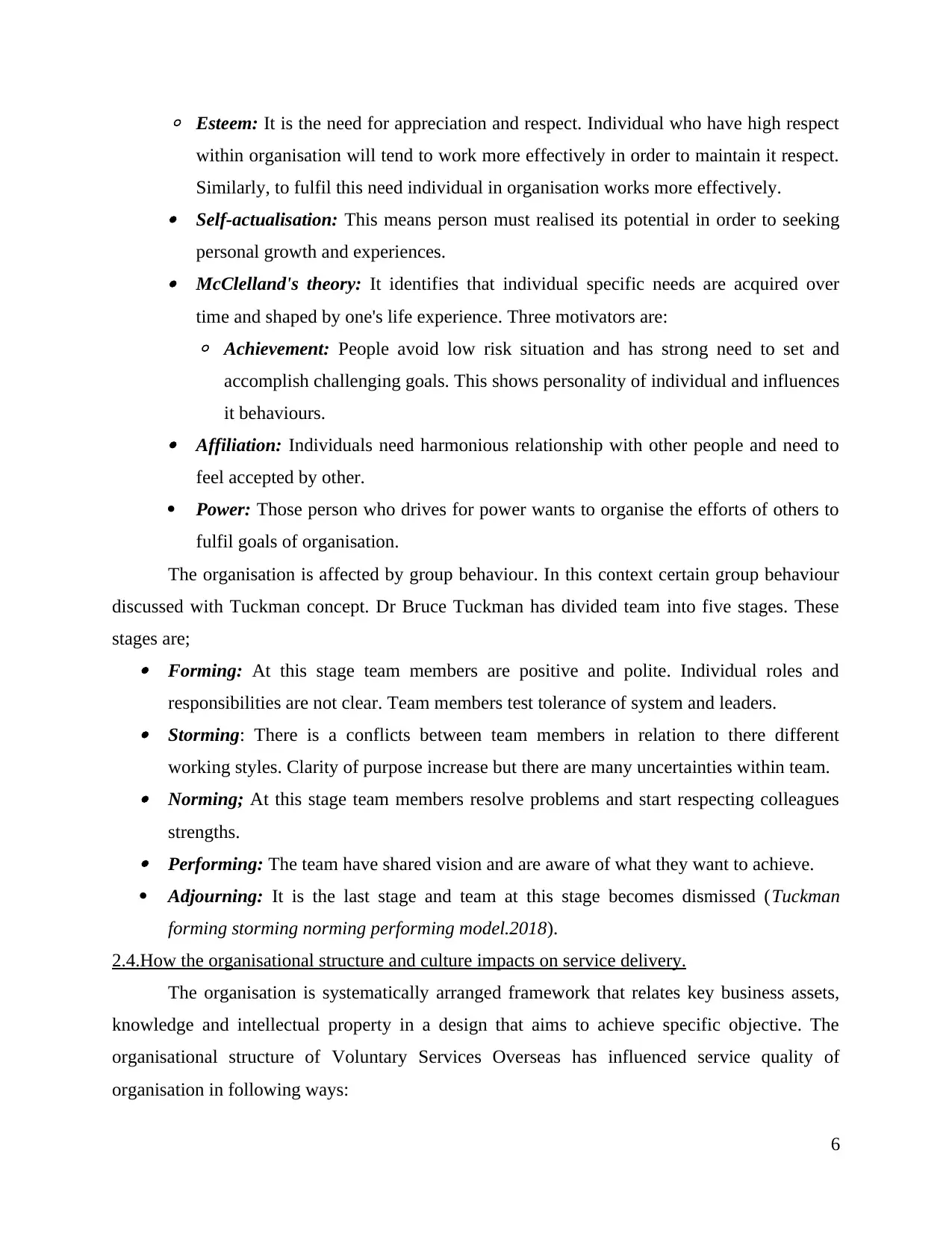
◦ Esteem: It is the need for appreciation and respect. Individual who have high respect
within organisation will tend to work more effectively in order to maintain it respect.
Similarly, to fulfil this need individual in organisation works more effectively.
Self-actualisation: This means person must realised its potential in order to seeking
personal growth and experiences.
McClelland's theory: It identifies that individual specific needs are acquired over
time and shaped by one's life experience. Three motivators are:
◦ Achievement: People avoid low risk situation and has strong need to set and
accomplish challenging goals. This shows personality of individual and influences
it behaviours.
Affiliation: Individuals need harmonious relationship with other people and need to
feel accepted by other.
Power: Those person who drives for power wants to organise the efforts of others to
fulfil goals of organisation.
The organisation is affected by group behaviour. In this context certain group behaviour
discussed with Tuckman concept. Dr Bruce Tuckman has divided team into five stages. These
stages are; Forming: At this stage team members are positive and polite. Individual roles and
responsibilities are not clear. Team members test tolerance of system and leaders. Storming: There is a conflicts between team members in relation to there different
working styles. Clarity of purpose increase but there are many uncertainties within team. Norming; At this stage team members resolve problems and start respecting colleagues
strengths. Performing: The team have shared vision and are aware of what they want to achieve.
Adjourning: It is the last stage and team at this stage becomes dismissed (Tuckman
forming storming norming performing model.2018).
2.4.How the organisational structure and culture impacts on service delivery.
The organisation is systematically arranged framework that relates key business assets,
knowledge and intellectual property in a design that aims to achieve specific objective. The
organisational structure of Voluntary Services Overseas has influenced service quality of
organisation in following ways:
6
within organisation will tend to work more effectively in order to maintain it respect.
Similarly, to fulfil this need individual in organisation works more effectively.
Self-actualisation: This means person must realised its potential in order to seeking
personal growth and experiences.
McClelland's theory: It identifies that individual specific needs are acquired over
time and shaped by one's life experience. Three motivators are:
◦ Achievement: People avoid low risk situation and has strong need to set and
accomplish challenging goals. This shows personality of individual and influences
it behaviours.
Affiliation: Individuals need harmonious relationship with other people and need to
feel accepted by other.
Power: Those person who drives for power wants to organise the efforts of others to
fulfil goals of organisation.
The organisation is affected by group behaviour. In this context certain group behaviour
discussed with Tuckman concept. Dr Bruce Tuckman has divided team into five stages. These
stages are; Forming: At this stage team members are positive and polite. Individual roles and
responsibilities are not clear. Team members test tolerance of system and leaders. Storming: There is a conflicts between team members in relation to there different
working styles. Clarity of purpose increase but there are many uncertainties within team. Norming; At this stage team members resolve problems and start respecting colleagues
strengths. Performing: The team have shared vision and are aware of what they want to achieve.
Adjourning: It is the last stage and team at this stage becomes dismissed (Tuckman
forming storming norming performing model.2018).
2.4.How the organisational structure and culture impacts on service delivery.
The organisation is systematically arranged framework that relates key business assets,
knowledge and intellectual property in a design that aims to achieve specific objective. The
organisational structure of Voluntary Services Overseas has influenced service quality of
organisation in following ways:
6
⊘ This is a preview!⊘
Do you want full access?
Subscribe today to unlock all pages.

Trusted by 1+ million students worldwide
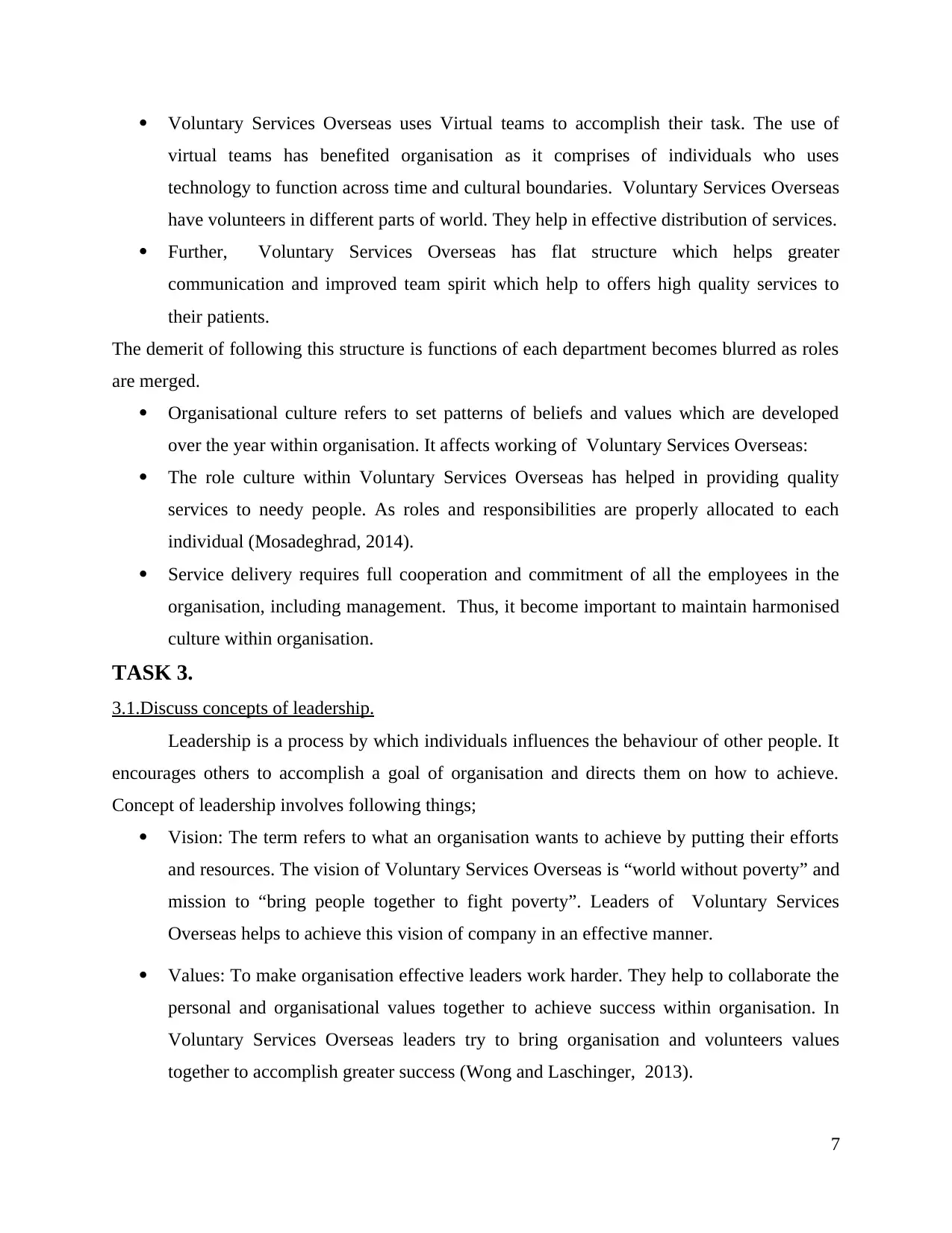
Voluntary Services Overseas uses Virtual teams to accomplish their task. The use of
virtual teams has benefited organisation as it comprises of individuals who uses
technology to function across time and cultural boundaries. Voluntary Services Overseas
have volunteers in different parts of world. They help in effective distribution of services.
Further, Voluntary Services Overseas has flat structure which helps greater
communication and improved team spirit which help to offers high quality services to
their patients.
The demerit of following this structure is functions of each department becomes blurred as roles
are merged.
Organisational culture refers to set patterns of beliefs and values which are developed
over the year within organisation. It affects working of Voluntary Services Overseas:
The role culture within Voluntary Services Overseas has helped in providing quality
services to needy people. As roles and responsibilities are properly allocated to each
individual (Mosadeghrad, 2014).
Service delivery requires full cooperation and commitment of all the employees in the
organisation, including management. Thus, it become important to maintain harmonised
culture within organisation.
TASK 3.
3.1.Discuss concepts of leadership.
Leadership is a process by which individuals influences the behaviour of other people. It
encourages others to accomplish a goal of organisation and directs them on how to achieve.
Concept of leadership involves following things;
Vision: The term refers to what an organisation wants to achieve by putting their efforts
and resources. The vision of Voluntary Services Overseas is “world without poverty” and
mission to “bring people together to fight poverty”. Leaders of Voluntary Services
Overseas helps to achieve this vision of company in an effective manner.
Values: To make organisation effective leaders work harder. They help to collaborate the
personal and organisational values together to achieve success within organisation. In
Voluntary Services Overseas leaders try to bring organisation and volunteers values
together to accomplish greater success (Wong and Laschinger, 2013).
7
virtual teams has benefited organisation as it comprises of individuals who uses
technology to function across time and cultural boundaries. Voluntary Services Overseas
have volunteers in different parts of world. They help in effective distribution of services.
Further, Voluntary Services Overseas has flat structure which helps greater
communication and improved team spirit which help to offers high quality services to
their patients.
The demerit of following this structure is functions of each department becomes blurred as roles
are merged.
Organisational culture refers to set patterns of beliefs and values which are developed
over the year within organisation. It affects working of Voluntary Services Overseas:
The role culture within Voluntary Services Overseas has helped in providing quality
services to needy people. As roles and responsibilities are properly allocated to each
individual (Mosadeghrad, 2014).
Service delivery requires full cooperation and commitment of all the employees in the
organisation, including management. Thus, it become important to maintain harmonised
culture within organisation.
TASK 3.
3.1.Discuss concepts of leadership.
Leadership is a process by which individuals influences the behaviour of other people. It
encourages others to accomplish a goal of organisation and directs them on how to achieve.
Concept of leadership involves following things;
Vision: The term refers to what an organisation wants to achieve by putting their efforts
and resources. The vision of Voluntary Services Overseas is “world without poverty” and
mission to “bring people together to fight poverty”. Leaders of Voluntary Services
Overseas helps to achieve this vision of company in an effective manner.
Values: To make organisation effective leaders work harder. They help to collaborate the
personal and organisational values together to achieve success within organisation. In
Voluntary Services Overseas leaders try to bring organisation and volunteers values
together to accomplish greater success (Wong and Laschinger, 2013).
7
Paraphrase This Document
Need a fresh take? Get an instant paraphrase of this document with our AI Paraphraser
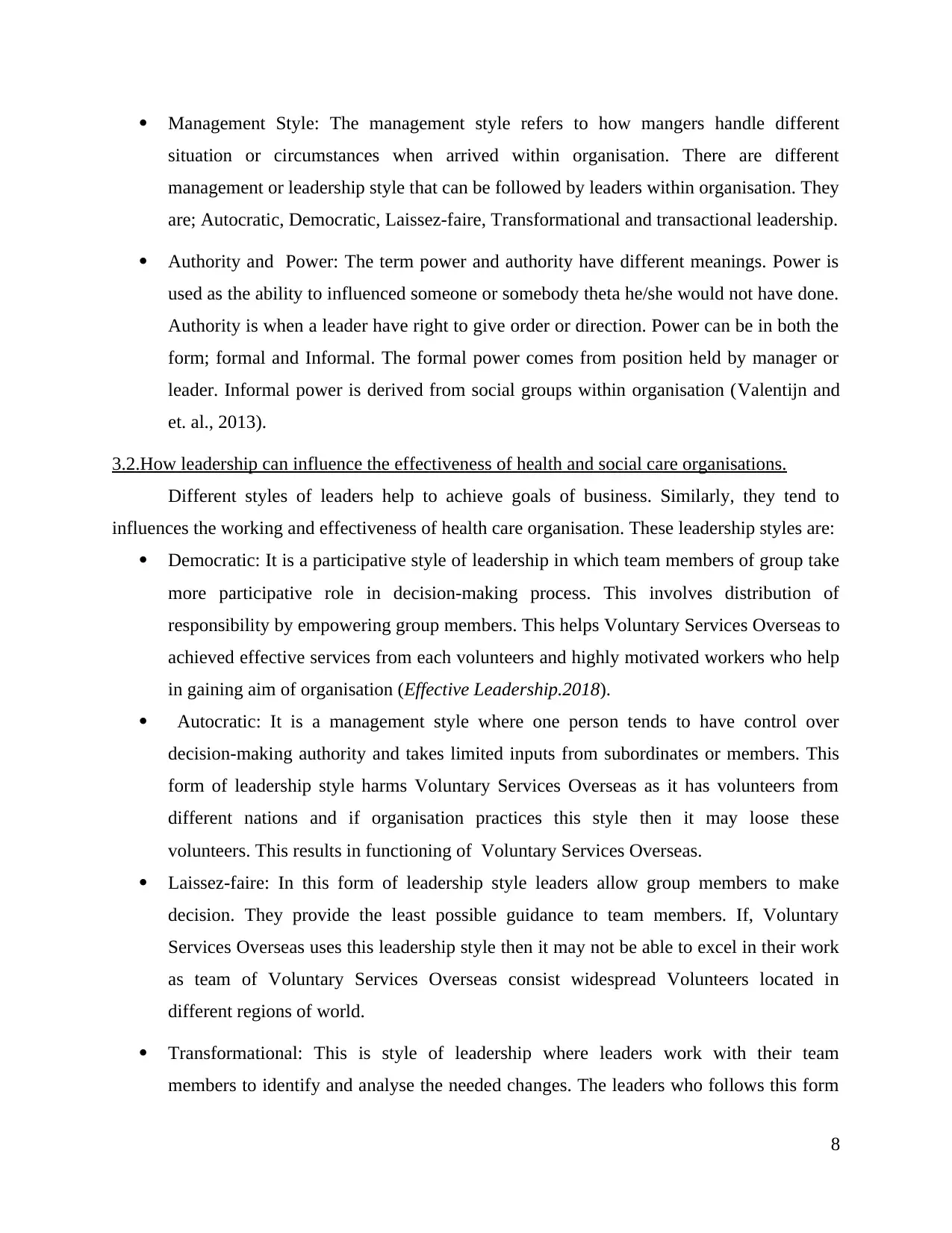
Management Style: The management style refers to how mangers handle different
situation or circumstances when arrived within organisation. There are different
management or leadership style that can be followed by leaders within organisation. They
are; Autocratic, Democratic, Laissez-faire, Transformational and transactional leadership.
Authority and Power: The term power and authority have different meanings. Power is
used as the ability to influenced someone or somebody theta he/she would not have done.
Authority is when a leader have right to give order or direction. Power can be in both the
form; formal and Informal. The formal power comes from position held by manager or
leader. Informal power is derived from social groups within organisation (Valentijn and
et. al., 2013).
3.2.How leadership can influence the effectiveness of health and social care organisations.
Different styles of leaders help to achieve goals of business. Similarly, they tend to
influences the working and effectiveness of health care organisation. These leadership styles are:
Democratic: It is a participative style of leadership in which team members of group take
more participative role in decision-making process. This involves distribution of
responsibility by empowering group members. This helps Voluntary Services Overseas to
achieved effective services from each volunteers and highly motivated workers who help
in gaining aim of organisation (Effective Leadership.2018).
Autocratic: It is a management style where one person tends to have control over
decision-making authority and takes limited inputs from subordinates or members. This
form of leadership style harms Voluntary Services Overseas as it has volunteers from
different nations and if organisation practices this style then it may loose these
volunteers. This results in functioning of Voluntary Services Overseas.
Laissez-faire: In this form of leadership style leaders allow group members to make
decision. They provide the least possible guidance to team members. If, Voluntary
Services Overseas uses this leadership style then it may not be able to excel in their work
as team of Voluntary Services Overseas consist widespread Volunteers located in
different regions of world.
Transformational: This is style of leadership where leaders work with their team
members to identify and analyse the needed changes. The leaders who follows this form
8
situation or circumstances when arrived within organisation. There are different
management or leadership style that can be followed by leaders within organisation. They
are; Autocratic, Democratic, Laissez-faire, Transformational and transactional leadership.
Authority and Power: The term power and authority have different meanings. Power is
used as the ability to influenced someone or somebody theta he/she would not have done.
Authority is when a leader have right to give order or direction. Power can be in both the
form; formal and Informal. The formal power comes from position held by manager or
leader. Informal power is derived from social groups within organisation (Valentijn and
et. al., 2013).
3.2.How leadership can influence the effectiveness of health and social care organisations.
Different styles of leaders help to achieve goals of business. Similarly, they tend to
influences the working and effectiveness of health care organisation. These leadership styles are:
Democratic: It is a participative style of leadership in which team members of group take
more participative role in decision-making process. This involves distribution of
responsibility by empowering group members. This helps Voluntary Services Overseas to
achieved effective services from each volunteers and highly motivated workers who help
in gaining aim of organisation (Effective Leadership.2018).
Autocratic: It is a management style where one person tends to have control over
decision-making authority and takes limited inputs from subordinates or members. This
form of leadership style harms Voluntary Services Overseas as it has volunteers from
different nations and if organisation practices this style then it may loose these
volunteers. This results in functioning of Voluntary Services Overseas.
Laissez-faire: In this form of leadership style leaders allow group members to make
decision. They provide the least possible guidance to team members. If, Voluntary
Services Overseas uses this leadership style then it may not be able to excel in their work
as team of Voluntary Services Overseas consist widespread Volunteers located in
different regions of world.
Transformational: This is style of leadership where leaders work with their team
members to identify and analyse the needed changes. The leaders who follows this form
8
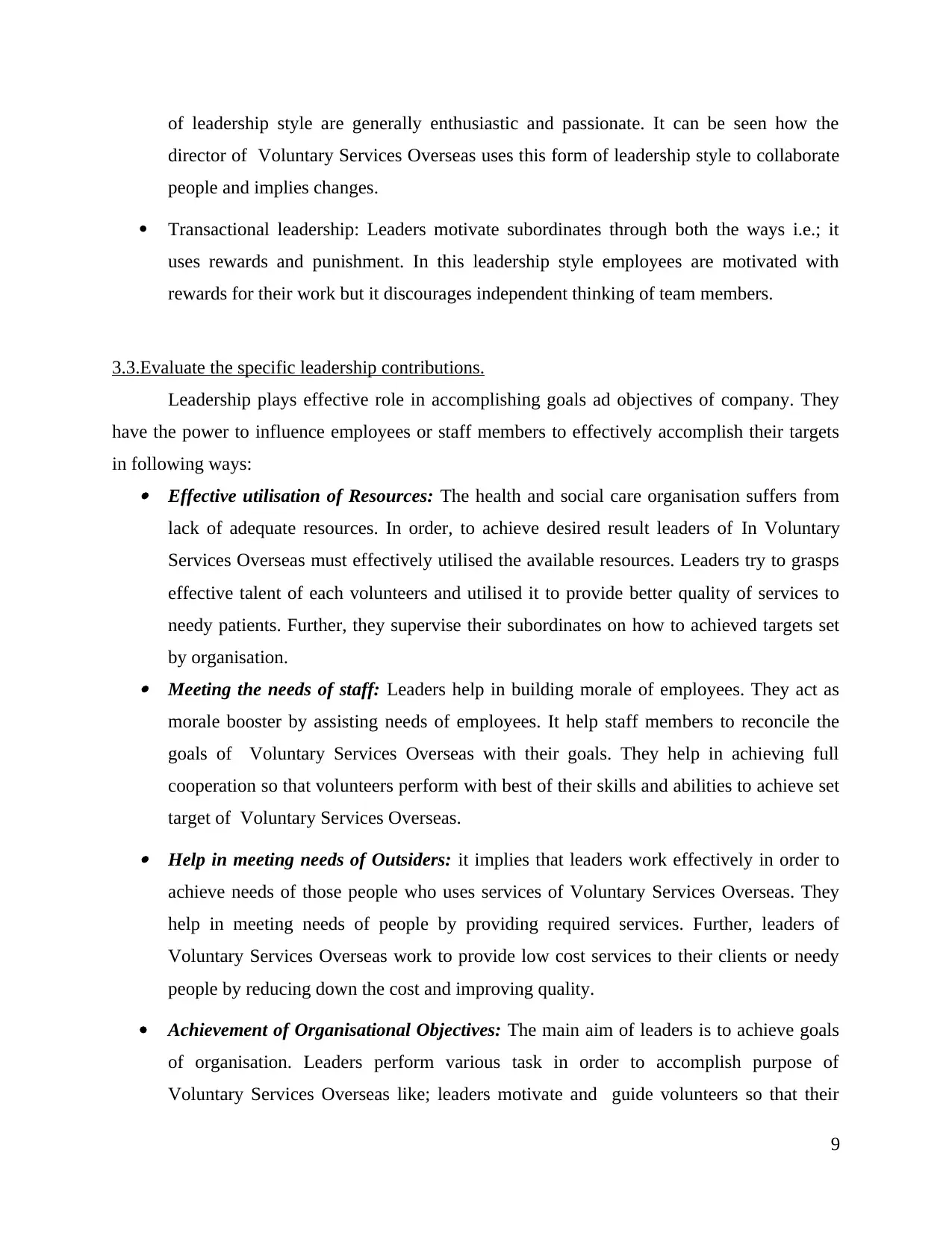
of leadership style are generally enthusiastic and passionate. It can be seen how the
director of Voluntary Services Overseas uses this form of leadership style to collaborate
people and implies changes.
Transactional leadership: Leaders motivate subordinates through both the ways i.e.; it
uses rewards and punishment. In this leadership style employees are motivated with
rewards for their work but it discourages independent thinking of team members.
3.3.Evaluate the specific leadership contributions.
Leadership plays effective role in accomplishing goals ad objectives of company. They
have the power to influence employees or staff members to effectively accomplish their targets
in following ways: Effective utilisation of Resources: The health and social care organisation suffers from
lack of adequate resources. In order, to achieve desired result leaders of In Voluntary
Services Overseas must effectively utilised the available resources. Leaders try to grasps
effective talent of each volunteers and utilised it to provide better quality of services to
needy patients. Further, they supervise their subordinates on how to achieved targets set
by organisation. Meeting the needs of staff: Leaders help in building morale of employees. They act as
morale booster by assisting needs of employees. It help staff members to reconcile the
goals of Voluntary Services Overseas with their goals. They help in achieving full
cooperation so that volunteers perform with best of their skills and abilities to achieve set
target of Voluntary Services Overseas. Help in meeting needs of Outsiders: it implies that leaders work effectively in order to
achieve needs of those people who uses services of Voluntary Services Overseas. They
help in meeting needs of people by providing required services. Further, leaders of
Voluntary Services Overseas work to provide low cost services to their clients or needy
people by reducing down the cost and improving quality.
Achievement of Organisational Objectives: The main aim of leaders is to achieve goals
of organisation. Leaders perform various task in order to accomplish purpose of
Voluntary Services Overseas like; leaders motivate and guide volunteers so that their
9
director of Voluntary Services Overseas uses this form of leadership style to collaborate
people and implies changes.
Transactional leadership: Leaders motivate subordinates through both the ways i.e.; it
uses rewards and punishment. In this leadership style employees are motivated with
rewards for their work but it discourages independent thinking of team members.
3.3.Evaluate the specific leadership contributions.
Leadership plays effective role in accomplishing goals ad objectives of company. They
have the power to influence employees or staff members to effectively accomplish their targets
in following ways: Effective utilisation of Resources: The health and social care organisation suffers from
lack of adequate resources. In order, to achieve desired result leaders of In Voluntary
Services Overseas must effectively utilised the available resources. Leaders try to grasps
effective talent of each volunteers and utilised it to provide better quality of services to
needy patients. Further, they supervise their subordinates on how to achieved targets set
by organisation. Meeting the needs of staff: Leaders help in building morale of employees. They act as
morale booster by assisting needs of employees. It help staff members to reconcile the
goals of Voluntary Services Overseas with their goals. They help in achieving full
cooperation so that volunteers perform with best of their skills and abilities to achieve set
target of Voluntary Services Overseas. Help in meeting needs of Outsiders: it implies that leaders work effectively in order to
achieve needs of those people who uses services of Voluntary Services Overseas. They
help in meeting needs of people by providing required services. Further, leaders of
Voluntary Services Overseas work to provide low cost services to their clients or needy
people by reducing down the cost and improving quality.
Achievement of Organisational Objectives: The main aim of leaders is to achieve goals
of organisation. Leaders perform various task in order to accomplish purpose of
Voluntary Services Overseas like; leaders motivate and guide volunteers so that their
9
⊘ This is a preview!⊘
Do you want full access?
Subscribe today to unlock all pages.

Trusted by 1+ million students worldwide
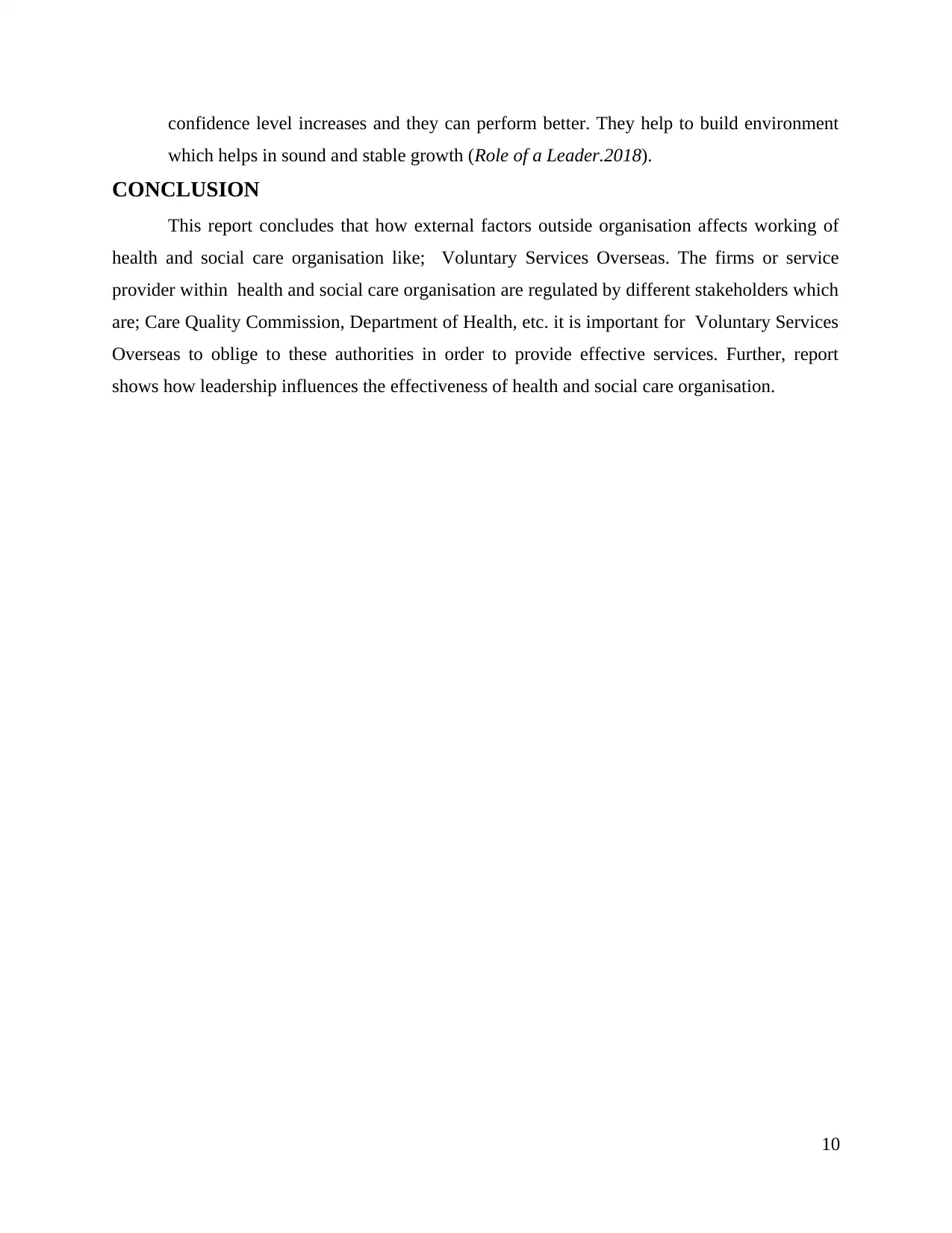
confidence level increases and they can perform better. They help to build environment
which helps in sound and stable growth (Role of a Leader.2018).
CONCLUSION
This report concludes that how external factors outside organisation affects working of
health and social care organisation like; Voluntary Services Overseas. The firms or service
provider within health and social care organisation are regulated by different stakeholders which
are; Care Quality Commission, Department of Health, etc. it is important for Voluntary Services
Overseas to oblige to these authorities in order to provide effective services. Further, report
shows how leadership influences the effectiveness of health and social care organisation.
10
which helps in sound and stable growth (Role of a Leader.2018).
CONCLUSION
This report concludes that how external factors outside organisation affects working of
health and social care organisation like; Voluntary Services Overseas. The firms or service
provider within health and social care organisation are regulated by different stakeholders which
are; Care Quality Commission, Department of Health, etc. it is important for Voluntary Services
Overseas to oblige to these authorities in order to provide effective services. Further, report
shows how leadership influences the effectiveness of health and social care organisation.
10
Paraphrase This Document
Need a fresh take? Get an instant paraphrase of this document with our AI Paraphraser
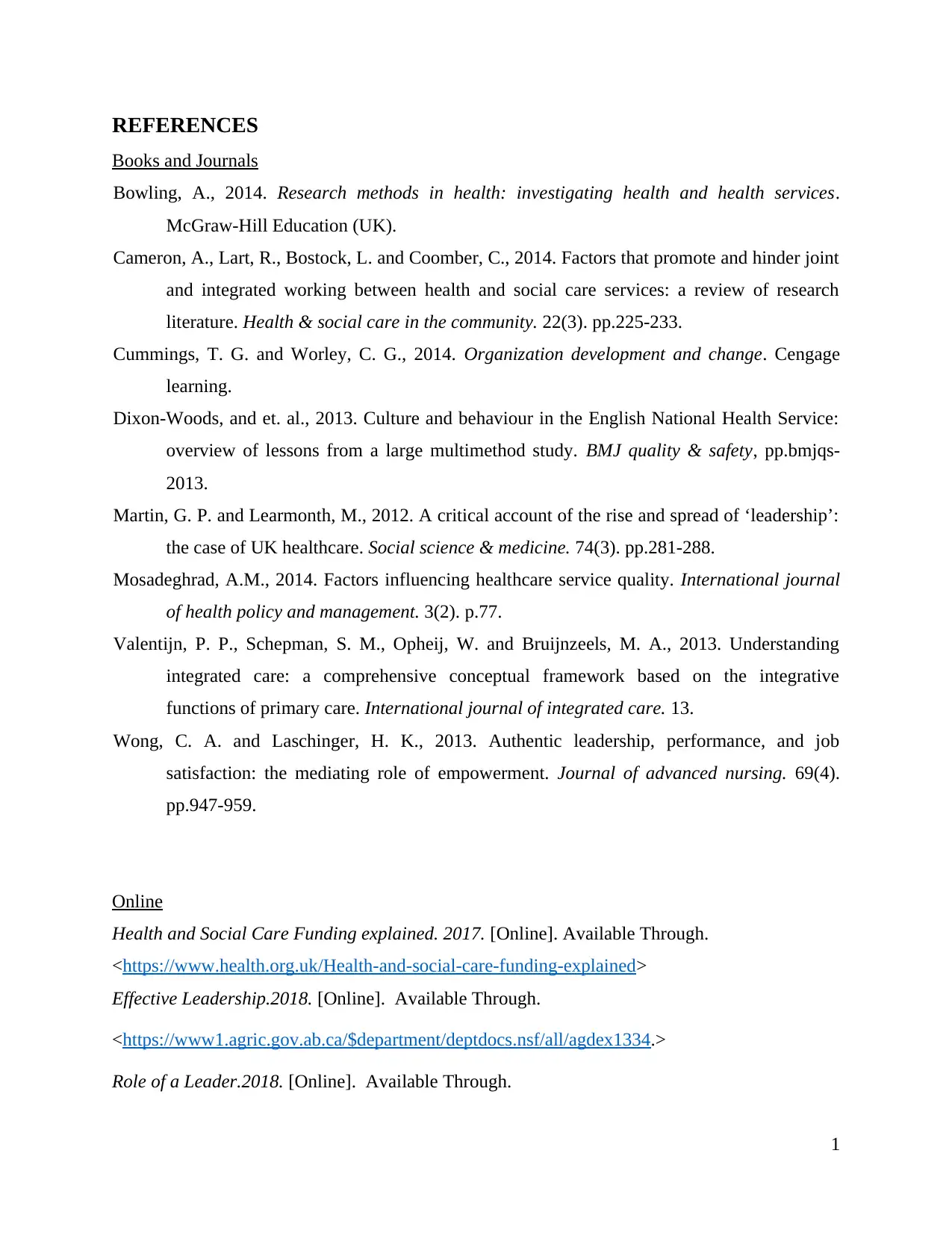
REFERENCES
Books and Journals
Bowling, A., 2014. Research methods in health: investigating health and health services.
McGraw-Hill Education (UK).
Cameron, A., Lart, R., Bostock, L. and Coomber, C., 2014. Factors that promote and hinder joint
and integrated working between health and social care services: a review of research
literature. Health & social care in the community. 22(3). pp.225-233.
Cummings, T. G. and Worley, C. G., 2014. Organization development and change. Cengage
learning.
Dixon-Woods, and et. al., 2013. Culture and behaviour in the English National Health Service:
overview of lessons from a large multimethod study. BMJ quality & safety, pp.bmjqs-
2013.
Martin, G. P. and Learmonth, M., 2012. A critical account of the rise and spread of ‘leadership’:
the case of UK healthcare. Social science & medicine. 74(3). pp.281-288.
Mosadeghrad, A.M., 2014. Factors influencing healthcare service quality. International journal
of health policy and management. 3(2). p.77.
Valentijn, P. P., Schepman, S. M., Opheij, W. and Bruijnzeels, M. A., 2013. Understanding
integrated care: a comprehensive conceptual framework based on the integrative
functions of primary care. International journal of integrated care. 13.
Wong, C. A. and Laschinger, H. K., 2013. Authentic leadership, performance, and job
satisfaction: the mediating role of empowerment. Journal of advanced nursing. 69(4).
pp.947-959.
Online
Health and Social Care Funding explained. 2017. [Online]. Available Through.
<https://www.health.org.uk/Health-and-social-care-funding-explained>
Effective Leadership.2018. [Online]. Available Through.
<https://www1.agric.gov.ab.ca/$department/deptdocs.nsf/all/agdex1334.>
Role of a Leader.2018. [Online]. Available Through.
1
Books and Journals
Bowling, A., 2014. Research methods in health: investigating health and health services.
McGraw-Hill Education (UK).
Cameron, A., Lart, R., Bostock, L. and Coomber, C., 2014. Factors that promote and hinder joint
and integrated working between health and social care services: a review of research
literature. Health & social care in the community. 22(3). pp.225-233.
Cummings, T. G. and Worley, C. G., 2014. Organization development and change. Cengage
learning.
Dixon-Woods, and et. al., 2013. Culture and behaviour in the English National Health Service:
overview of lessons from a large multimethod study. BMJ quality & safety, pp.bmjqs-
2013.
Martin, G. P. and Learmonth, M., 2012. A critical account of the rise and spread of ‘leadership’:
the case of UK healthcare. Social science & medicine. 74(3). pp.281-288.
Mosadeghrad, A.M., 2014. Factors influencing healthcare service quality. International journal
of health policy and management. 3(2). p.77.
Valentijn, P. P., Schepman, S. M., Opheij, W. and Bruijnzeels, M. A., 2013. Understanding
integrated care: a comprehensive conceptual framework based on the integrative
functions of primary care. International journal of integrated care. 13.
Wong, C. A. and Laschinger, H. K., 2013. Authentic leadership, performance, and job
satisfaction: the mediating role of empowerment. Journal of advanced nursing. 69(4).
pp.947-959.
Online
Health and Social Care Funding explained. 2017. [Online]. Available Through.
<https://www.health.org.uk/Health-and-social-care-funding-explained>
Effective Leadership.2018. [Online]. Available Through.
<https://www1.agric.gov.ab.ca/$department/deptdocs.nsf/all/agdex1334.>
Role of a Leader.2018. [Online]. Available Through.
1
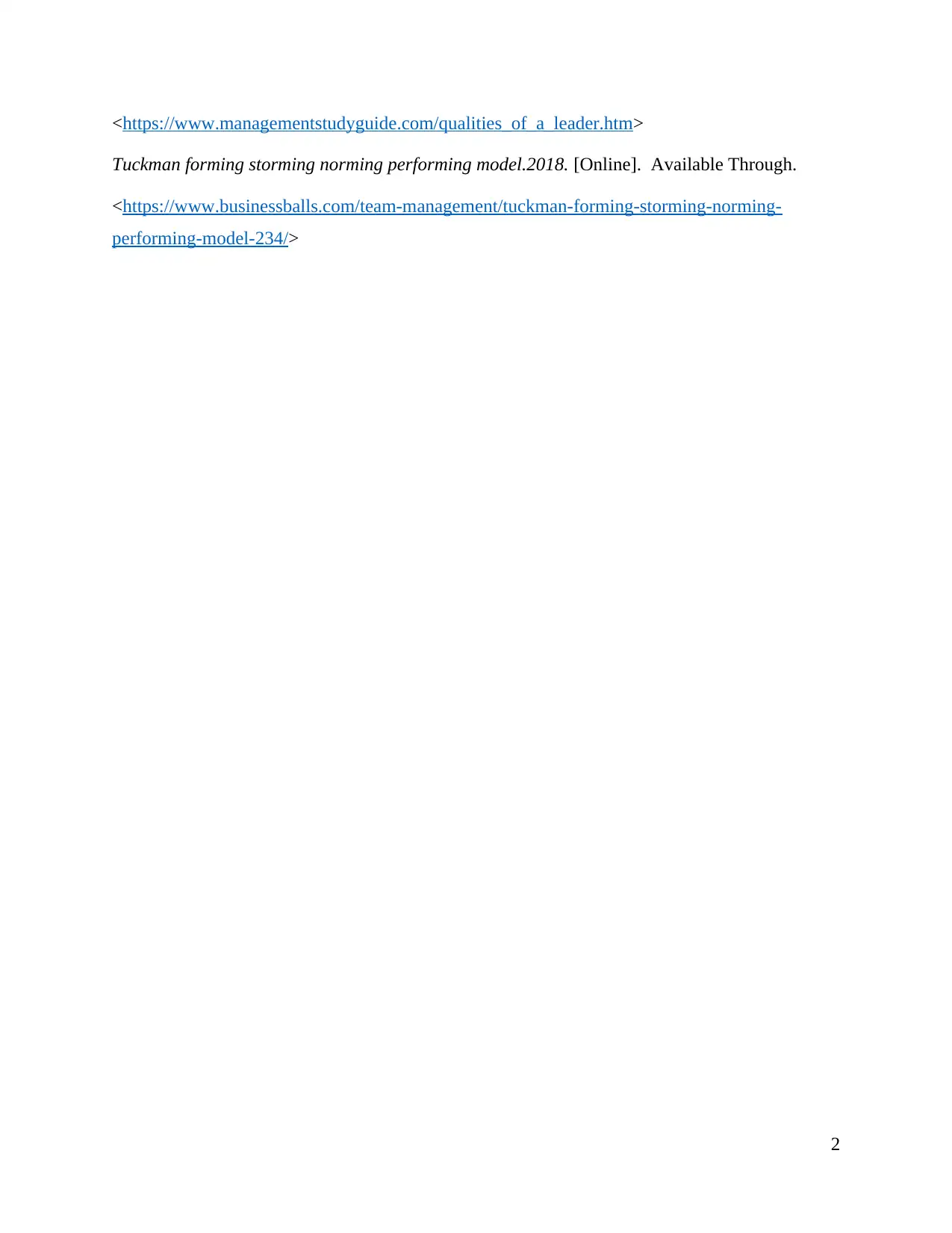
<https://www.managementstudyguide.com/qualities_of_a_leader.htm>
Tuckman forming storming norming performing model.2018. [Online]. Available Through.
<https://www.businessballs.com/team-management/tuckman-forming-storming-norming-
performing-model-234/>
2
Tuckman forming storming norming performing model.2018. [Online]. Available Through.
<https://www.businessballs.com/team-management/tuckman-forming-storming-norming-
performing-model-234/>
2
⊘ This is a preview!⊘
Do you want full access?
Subscribe today to unlock all pages.

Trusted by 1+ million students worldwide
1 out of 12
Related Documents
Your All-in-One AI-Powered Toolkit for Academic Success.
+13062052269
info@desklib.com
Available 24*7 on WhatsApp / Email
![[object Object]](/_next/static/media/star-bottom.7253800d.svg)
Unlock your academic potential
Copyright © 2020–2026 A2Z Services. All Rights Reserved. Developed and managed by ZUCOL.





